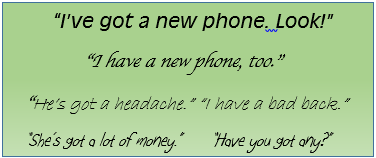‘Have’ has the same meaning as ‘have got’ for possession, family, appearance, illnesses, or timetabled events. Both are fine in England, America, Australia, and so on. ‘Have got’ may be more common in England. It is also more common in spoken English than written English.
Do you have a car? > Yes, I do. / No, I don’t. // I have a car. // I don’t have a car.
Have you got a car? > Yes, I have. / No, I haven’t. // I’ve got a car. // I haven’t got a car.
I have a cold. / I’ve got a cold. // I have a sister. / I’ve got a sister. // I have brown hair. / I’ve got brown hair. // He has a test tomorrow. / He’s got a test tomorrow.
NOTE: Try to make sure your answer matches the style. Have you got…? > Yes, I do have.
NOTE: I have to work and I’ve got to work are also both OK.
NOTE: For the past we only use Did you have…? / Yes, I did. / No, I didn’t. / I had … / I didn’t have … / We don’t say: Had you got …?
NOTE: When have has other meanings, we don’t use have got:
I have (=eat) breakfast/lunch/toast for breakfast/a snack. I’ve got breakfast.
I have (=drink) coffee for breakfast. I’ve got coffee for breakfast.
I have (= host) a party/BBQ/picnic every summer. I’ve got a BBQ every summer.
ラボール英会話教室.png)
